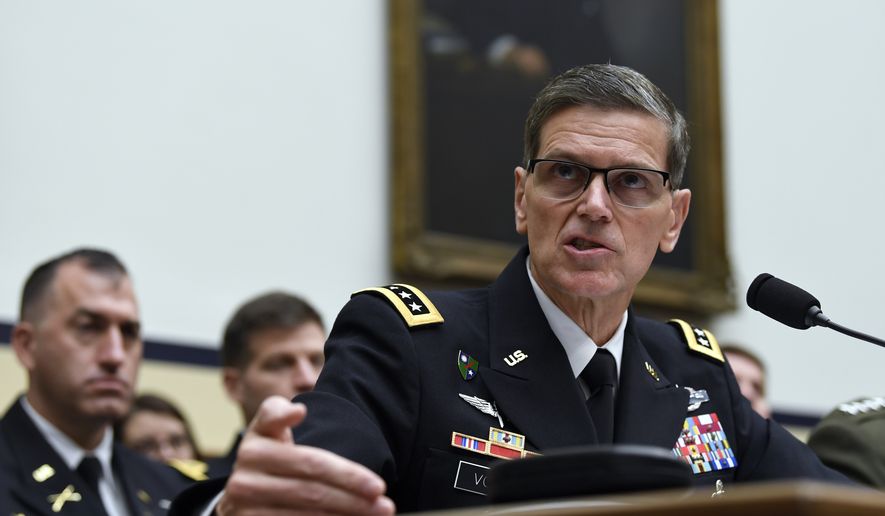Islamic State fighters are “unrepentant, unbroken and radicalized” even as the U.S. and its Syrian allies near a complete battlefield victory over the terror group in its last stronghold near the Syrian border with Iraq, the senior U.S. military commander for the region said Thursday.
The formidable swath territory held by the group known as ISIS in Syria and northern Iraq has now has collapsed into an area of “less than a single square mile” near the Euphrates River Valley, Central Command chief Gen. Joseph Votel told House lawmakers Thursday.
While President Trump has said Islamic State has been decimated, Gen. Votel seconded fears of private analysts that the group will now revert to a classic insurgency with thousands of dedicated fighters and sleeper cells across the globe, posing a different kind of threat to the U.S. and its allies.
Gen. Votel, who is scheduled to end his tenure as command chief this spring, told the House Armed Services Committee the disintegration of Islamic State’s land empire will be “a monumental military accomplishment” once the organization’s final redoubts are liberated.
Victories by the U.S. and its Kurdish and Arab allies were critical to Mr. Trump’s decision to pull out all 2,000 U.S. troops from Syria in December. Former Defense Secretary James Mattis resigned in part to protest the abrupt troop withdrawal that same month. Gen. Votel later acknowledged he was not consulted on Mr. Trump’s decision to withdraw.
On Thursday, Gen. Votel said he felt no pressure from the White House to meet a specific deadline to draw down U.S. forces. Mr. Trump has modified his withdrawal order and some 400 U.S. personnel will remain inside Syria indefinitely.
A handful of Islamic State fighters remain dug in near Baghouz — the small enclave near the Syrian city of Deir-e-Zour where the majority of the fighting has taken place over the last several weeks. But many have laid down their arms and surrendered to U.S.-backed forces in the country. But even in the face of defeat, the threat posed by the terror group is evident.
“Observations by our men and women on the ground highlight that the ISIS population being evacuated from the remaining vestiges of the caliphate largely remain unrepentant, unbroken and radicalized,” Gen. Votel said, testifying alongside Africa Command chief Gen. Thomas Waldhauser.
Even Islamic State’s final surrender may not be the victory envisioned by the White House and international community, but rather a calculated decision by the terror group, in order to fight again another day.
“What we are seeing now is not the surrender of ISIS as an organization, but in fact a calculated decision to preserve the safety of their families and preservation of their capabilities” to continue their fight, Gen. Votel said. The vestiges of Islamic State, who have laid down their arms and bled back into the region, “will sow the seeds of future violent extremism” in the Middle East and across the globe, he said.
The general said the main mission of the smaller U.S. deployment in Syria will be to help local security forces deal with remaining Islamic State terror cells. Pentagon officials have set a Friday deadline for European allies in the anti-Islamic State coalition to dedicate troops to that U.S. peacekeeping force, the Wall Street Journal reported.
Chairman of the Joint Chiefs of Staff Gen. Joseph Dunford noted in December that U.S. and coalition forces in Syria would have to establish a local security force of between 35,000 to 40,000 fighters, as a bulwark against the terror group. To date, between 20 to 30 percent of that force is ready to fight, according to the Pentagon.
“We will need to maintain a vigilant offensive,” against Islamic State in Syria and elsewhere across globe once the caliphate falls, Gen. Votel said on Washington’s future military strategy against the terror group.
Gen. Waldhauser told the House committee that planned troop cuts on the African continent will have no impact on counterterror operations in Libya and Somalia, the Associated Press reported.
The head of U.S. Africa Command said about 300 troops will be withdrawn by June 2020. The Pentagon ordered the cut as part of a new overall defense strategy that focuses on major rivals such as China and Russia.
• Carlo Muñoz can be reached at cmunoz@washingtontimes.com.




Please read our comment policy before commenting.